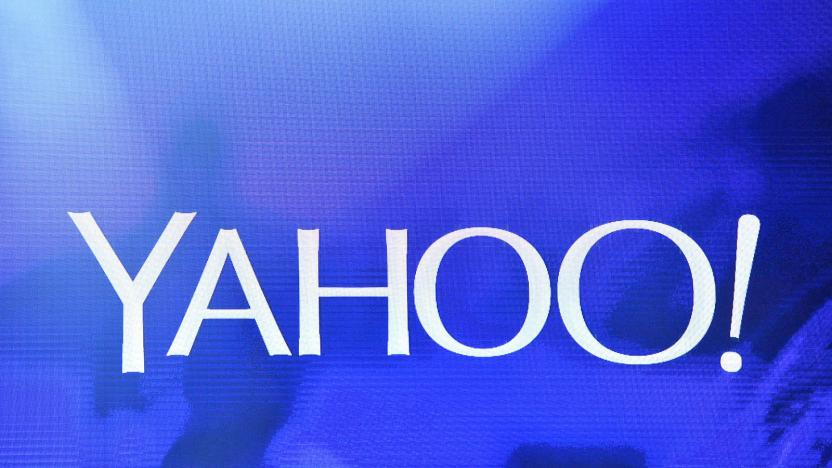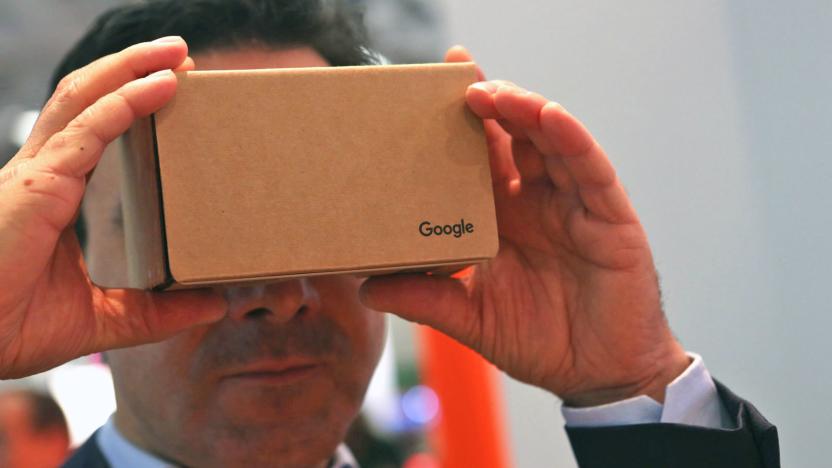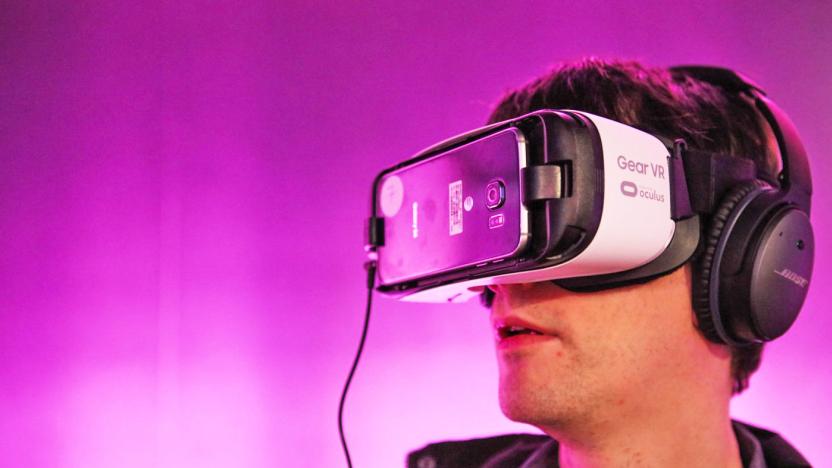AOL
Latest

AOL's Alto email Dashboard adds Alexa and Slack integrations
Email, it's the granddaddy of messaging apps. That doesn't mean it doesn't need a little nudge into the teens... the tens... whatever we're calling this decade. AOL's Alto is exactly that, a modern email client that extracts all the useful info tucked away within it, putting it front and center in a Google Now-like "Dashboard." Today, it's getting a little more up to date, with hooks into Amazon's ubiquitous Alexa, and the work-chat du jour, Slack.

Verizon reportedly looking for a $1 billion discount on Yahoo
Back in July, Verizon (the parent company of Engadget) agreed to acquire (most of) Yahoo for $4.83 billion, and normally, that would be the end of things. However, since then, Yahoo confirmed it suffered a massive security breach in 2014, and reports claim that its security chief quit last year after discovering its participation in bulk US government surveillance of incoming emails. Now, the New York Post cites multiple sources claiming that executive Tim Armstrong is upset about the lack of disclosure and seeking to get out of the deal or cut the price.

AOL's Alto Dashboard is a daily organizer for your email
In this era of texting and instant messaging you might not be emailing many long, heartfelt letters to your best friend from college. I certainly don't. But I'm still drowning in a sea of less personal correspondence: Receipts. Bill payments. Flight confirmations. Even with apps like Gmail sorting these assorted messages into tidy little folders, it's pretty easy to lose track of the things I might need to know. Alto, the email app from AOL (Engadget's parent company), is attempting to fix inboxes like mine with its new feature, Alto Dashboard. Out today, the dashboard places the most important bits front and center and lets you act on them, without ever leaving the app.

Google's speeding up mobile web search results for all sites
The time you spend waiting for mobile search results to load is about to drop drastically. Google announced on Tuesday that it is expanding the scope of its Accelerated Mobile Pages program to include non-publishing websites.

Verizon is buying struggling giant Yahoo for $4.83 billion
After months of gesturing and negotiations, Yahoo has finally found a buyer: Verizon. The mobile operator, which is also the parent company of AOL and Engadget, confirmed today that it will pay $4.83 billion for Yahoo's web business. All of the company's advertising, content, search and mobile operations will be transferred to Verizon and merged with AOL.

Huffington Post makes VR a staple of its newsrooms
At the rate things are going, you might have a hard time avoiding online virtual reality. The Huffington Post (owned by AOL and Verizon, just like us) is launching players for 360-degree and VR content on just about every platform it uses. You'll logically see them in articles on the web (both desktop and mobile), but the outlet is also promising immersive experiences in its Android and iOS apps. You'll first see the technology in action during Ryot's coverage of the Republican National Convention when it starts on July 18th, and it should reach all of HuffPo's international editions. VR won't just be reserved for the occasional experiment, we'd add -- the aim is to use it whenever it makes sense.

Gene editing can end disease and fight global famine
We're looking at the single greatest advancement in genetics since Mendelev started growing peas. CRISPR-Cas9 gene-modification technology is powerful enough to cure humanity's worst diseases, yet simple enough to be used by amateur biologists. You thought 3-D printers and the maker movement were going to change the world? Get ready for a new kind of tinkerer -- one that wields gene-snipping scissors.

Google and AOL team up to stop tech talent leaving NYC
New York City may be the Big Apple, but it plays second fiddle to Silicon Valley when it comes to technology. That's why a number of companies located there including (Engadget's parent company) AOL, Bloomberg and, yes, California-based Google and Facebook have formed an advocate association called Tech:NYC. In a blog post, AOL's Tim Armstrong and New York venture capitalist Fred Wilson say "we feel that the NYC tech community deserves a more formal organization to represent itself before local and state governments and the business community and civic sector."

AOL bought its own VR studio for HuffPo videos
News outlets have already jumped on the VR bandwagon, and today another publication joins the fray. Today, AOL announced its acquisition of the LA-based virtual reality and 360-degree video production studio RYOT. By bringing the company under its wing, AOL will leverage the resources to boost The Huffington Post's quest to "re-imagine journalism as we move into the next generation of dynamic storytelling." In fact, Arianna Huffington & Co. have already teamed up with RYOT, producing "The Crossing:" an immersive series about the refugee crisis in Greece.

AOL chief wants to turn the company into an ad empire
Verizon bought Engadget's parent company AOL for its ad tech, that much we knew. And the man behind that deal was none other than AOL Chief Executive Tim Armstrong, who The Wall Street Journal reports has an eye on building the company into a massive mobile ad empire. By 2020 Armstrong aims for AOL to jump from its current 700 million users to two billion, and generate between $10 billion and $20 billion in revenue. With that, Armstrong says AOL will be the top global media company.

Twitter, Facebook support Apple in its fight with the FBI
As Apple CEO Tim Cook insists that his company should not be forced to help the FBI weaken security on an iPhone (Not sure why that matters? Get an explanation of the key issues here.), a few more companies have stepped forward in support. Yesterday Google CEO Sundar Pichai issued a carefully-worded statement, followed today by a statement from Facebook to USA Today, and a one-liner from Twitter CEO Jack Dorsey. Facebook said that requirements to weaken security would create a "chilling precedent," while Dorsey simply said that he stands with Cook and Apple.

Verizon's customer-tracking 'supercookies' connect to AOL ads
In the last year it's become known that Verizon uses "supercookies" (aka UIDH or Relevant Mobile Advertising) to track what its mobile customers are doing, but now it's taking a step further by quietly linking that information to ads from AOL (the parent company of Engadget, which is also now owned by Verizon). According to ProPublica, the AOL ad network reaches across 40 percent of the internet, and by working with Verizon's UIDH (Unique Identifying Device Header) it can track in great detail what apps people on Verizon Wireless use and what websites they visit. Unfortunately, beyond just serving up targeted ads, the information is also unencrypted and could possibly be used by others to track you. The only good news? Verizon subscribers can opt out, which you can do by following this link or calling 1-866—211—0874.

Verizon is buying AOL for $4.4 billion
AOL, Engadget's parent company, has just been acquired by Verizon for $4.4 billion, or around $50 a share. The carrier believes that a tie-in between the two businesses will boost Big Red's online video and content strategy. AOL itself, far from just being the name on all those discarded dial-up internet CDs, is also a player in the online ad business -- and has developed several behind-the-scenes products for marketers.

TUAW ceasing publication on February 3, 2015
We're probably the last tech site to report on our own demise, but we ask your forgiveness -- it's been a rough couple of days. Yes, TUAW will be ceasing publication this week. Expect to see our last posts sometime on Tuesday, February 3. You'll probably see some personal farewells from a number of our bloggers between now and then. We have a large, loyal following of readers and we still have the fire in us when it comes to our passion for Apple products. However, TUAW is a small cog in a big machine -- AOL -- and our niche offering did not fit in with the corporate direction for larger content providers such as Engadget and TechCrunch. The corporation is doubling down on all of the large properties, and the resources -- however meager -- being expended on sites like TUAW and Joystiq are being reallocated to fuel that big machine. Like it or not, that's the reality for any major corporation. Don't worry about the TUAW staff; our talent and passion will be put to use elsewhere, and you're sure to see our names pop up wherever there's a need for solid reporting and writing about the world's most successful company -- Apple. We had a great time bringing you the news and reviews on TUAW, and for a while, at least, those articles will be available as part of Engadget. Good luck to all of our readers, stay well, and keep in touch.

Tech companies ask the Senate to pass surveillance reform law
Google, Apple, Microsoft, Twitter and Facebook. Normally these companies are mortal enemies. But, when it comes to curbing government surveillance, they're all on the same page. They've joined forces to form the Reform Government Surveillance coalition. The group is calling the US Senate to pass the USA FREEDOM Act, which could go up for vote as early as this week. The bill would enact a number of important reforms regarding the government's collection and use of data. For one it would end the practice of bulk metadata collection from the internet. It would also demand greater transparency from both the government and the tech companies themselves.

MessageHub tries to be your one stop for all social networks
MessageHub wants to be you go-to app for all of your digital communications. That's not an exaggeration, I mean all. It supports Facebook, Twitter, LinkedIn, Yahoo and more. It also supports email accounts Gmail and Outlook. If you set up all of your accounts in this app, you could keep up with everything going on in all of them in one place. Well, that's the theory anyway. But we'll come back to that in a moment. MessageHub is free and is designed for both iPhone and iPad and requires iOS 7.1 and up. On first run, you are given the option of signing in via Facebook, Twitter, or LinkedIn. This links you up to your first account. From there you can link up as many others as you want. Of course, the more you add, the more will appear in your "Everyone" section. I find that often Twitter or Facebook alone can be like drinking from a firehose. Combined views (especially when they include my email inboxes) are simply overwhelming to me. This is why services like Facebook, Twitter, and others provide the capability to create lists of people. I can (and have) create lists for the most important people in my life so I am sure not to miss an important update from them, lost in the noise of the latest meme everyone is reposting. Thus, Facebook and Twitter become more manageable for me and I can catch up with fast glances through the day rather than getting sucked into the vortex of endless streaming content. MessageHub provides none of this. With this app, it is everything at all times. Worse, the main view tries to utilize white space to make the interface breathe but it has the effect of only showing two to three posts at a time making me have to constantly scroll to get through the sheer mass of content. One handy, if somewhat confusing feature is the "Conversations" section. This aggregates together the posts of a given person (sometimes) and conversations held in Facebook messaging or via Twitter, etc. I honestly couldn't quite figure out which it is supposed to be when. Sometimes I see a person's recent posts, sometimes conversations I've had with them, and often nothing at all. For example, I have had conversations with my wife on Facebook messages and she has also posted a few things in the last day. When I look at her entry in Conversations (created a few weeks back), nothing is displayed (and this is despite the fact that in the list of conversations, there is an excerpt from a previous message one of us sent the other. So, in the end, I get what this app is trying to do but the confusing Conversations section, the large amount of white space limiting posts per screen, and the lack of support for lists (you can create groups in Conversations which approximates this feature but I could not get it to reliably work) gets in the way of its goals. MessageHub is free and if it is actively maintained and improved it may become quite useful.

Facebook's anonymous Rooms is a chat app that feels like the old days
Facebook's new Rooms app is weird, and it isn't long after installation that you figure out why. You don't log in with your Facebook credentials. Your profile picture appears nowhere. It doesn't tap into your contacts. If Rooms' iOS-only App Store listing didn't proudly proclaim it was a Facebook product, you'd almost certainly never know it was brewed within the social giant's cavernous confines. Seems a little off-kilter for a chat app, especially one with this pedigree. Instead, it just lets you create those eponymous Rooms -- they're like those AOL chatrooms of yore, dedicated to any topic (or no topic at all) and augmented with the the ability to moderate posts like a power-tripping VIP on a forum. When it's spelled out like that, doesn't it all sound just delightfully anachronistic? Update: Did you have trouble downloading Rooms earlier? You're not the only one, but those problems should be resolved, click here to give it another shot.

The Game Archaeologist: The return of Habitat
After over four years of writing for Massively, I've ceased to be surprised by how bizarre and unexpected this industry can be. However, if you had told me a few weeks ago that, of all things, Habitat would be coming back online, I would have laughed mightily in your face. And yet, that's exactly what's happening. The Museum of Arts and Digital Entertainment has taken up the challenge to restore LucasFilm's Habitat to working condition and then, for the first time ever, open this original virtual world up to the internet to play. Museum staff, former Habitat devs, and volunteers have been wrestling with the old code and hardware to make this happen, and I can think of no better topic for this week's column than to look at how this 28-year-old game for the Commodore 64 will emerge blinking in the light of the modern era. I reached out to MADE's director, Alex Handy, to chat about the project and get clarification concerning what steps will need to be taken between now and the moment the switch is thrown to power up Habitat.

Tech CEOs push US Senate for stronger surveillance reform
The CEOs of AOL, Apple, Dropbox, Facebook, Google, LinkedIn, Microsoft, Twitter and Yahoo! all agree: more needs to be done to reform the government's snooping capabilities. That's the thrust of a letter that appeared online yesterday, anyway. Though the list of signatories contains a handful of rivals, all of them agree that the version of the USA Freedom Act that recently passed through the US House of Representatives still sucks and that the US Senate needs to fix it.

Whatever happened to Netscape?
Netscape's story reads like a proper fairy tale: takeovers, fierce and hostile competition, split-ups, a giant payout and even a dragon! While Netscape may now only be a sweet, sweet memory to those who used it to first discover the web, the browser's monstrous impact has cemented it as one of the first and most important startups to shape the internet. Netscape's founders successfully plucked a brilliant idea from academia and pushed it onto the world's stage at a time when competition didn't exist, websites were not much more than plain-text blurbs and inline images were still revolutionary. Consider the battle that would ensue between this web pioneer and Microsoft. The "browser wars," as they came to be known, would ultimately lead to creation of Internet Explorer, Microsoft's antitrust suit and the formation of the Mozilla Project and Firefox.















